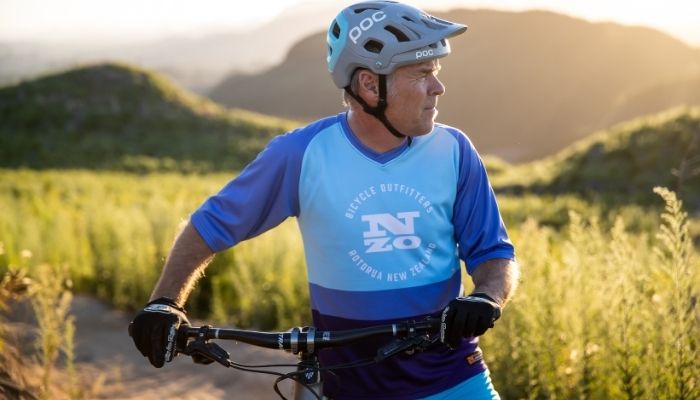It was only a couple of decades ago that mountain biking seemed more of a cameo activity in Rotorua, compared to the main attraction it is now, summoning riders from around the globe to ride our dirt gold.
And yet, Gary Sullivan and partner Glen Anderson still moved down from Auckland specifically to open a new mountain biking apparel business in the centre of Rotorua.
This was circa 1998 and Gary, or “Gaz” as he’s known in these parts, reckons there were maybe 100 people who would’ve been considered true-blue mountain bikers back then, and only about 30km worth of forest trails to thrash.
However, they needed a change from their busy illustration (his) and pattern-making and design (hers) businesses so they bet their livelihoods (and perhaps their sanity?) on a pair of hard-wearing mountain bike shorts and comfort-inducing padded shorts liners, the likes of which nobody had seen before.
Twenty three years, several more products, one global financial crisis, one name change, and one pandemic later, we’re happy to report that Nzo is still here today.
The early days
Prior to shifting southward, the adventuresome couple had come to Rotorua for a wee blat on the bikes to absolve themselves of their hectic life. Over a couple of post-ride lattes something shiny and two-wheeled caught Gaz’s eye: a couple vehicles drove by with bikes on the back.
The light went on and Gaz asked Glen why not open their business in Rotorua. “She was into it straight away.”
They reckoned the lower cost of rent and living in Rotorua provided a low-risk opportunity to try something new.
“It gave us the chance to experiment. If we’d have done in Auckland what we did here, we’d go broke, no doubt about it. The sport wasn’t big enough to support what we were trying to do.”
Technically, the sport wasn’t big enough in Rotorua either but Gaz and Glen forged ahead, trusting that mountain biking would take off. Eventually.
Take off it did, but not without some hefty hills to climb.
Operation NZone
At NZone, as it was called in the early days, everything was done onsite and from materials they were able to buy locally. Glen made the patterns – starting out with the riding shorts they called Dobies, and padded undershorts they called Cruiseliners.
From the little sewing room out back came the products they stocked, and along the way they talked to their customers to work out what else they wanted.
“Mountain biking was tiny compared to now. There was no established apparel solution. Nobody really had a fixed idea on what they should wear.”
Clearly Gaz and Glen had an inkling because Dobies – designed to wear 24/7, on and off the trails, and last forever – took off like a pro downhill rider on his last run.
“We’ve got a reputation for making durable product and it’s kind of a joke amongst our customers, they’ll show us pictures of stuff they still wear that they bought when we first opened.”
Word got out and others wanted in. A chain of shops threatened to make their own version of Dobies if NZone wouldn’t supply to them. Gaz and Glen didn’t see another option so they went wholesale.
The wheels fall off
When demand out-powered the two-person team, they tried to outsource the manufacturing within New Zealand.
“That went really badly, so after about a year and half of that, we sought manufacturing through agents in Auckland and said they could make them wherever they wanted.”
A name change to Nzo came next, and successful manufacturing in China gave the brand great products. But selling through retail outlets was difficult to manage at the size the company became – too big to be simple, too small to really go head-to-head with the international brands.
They decided to return to dealing directly with riders, via Nzo’s website. Shrinking a company isn’t easy, but they did it without too much trouble and moved back to manufacturing in New Zealand again.
At the same time, globalisation of the industry meant that companies that used to supply Nzo’s materials started closing down so the team was forced to turn to overseas producers again.
Back on track with production in China and distribution coming out of Hong Kong, it seemed Nzo was sailing through the silky-smooth berms of every rider’s dreams. By now, two-thirds of Nzo product was heading around the world, while only a third came home to be sold on the web, or through a great association with a local retail store which became Nzo/Ride Central in Rotorua.
Then a pandemic hit. The world came to a screeching halt; nothing and nobody went anywhere, including international freight. It was time to adjust. Again.
Back on track
Adaptation is by now old hat for Gaz and Glen, so while they waited for the world to come unstuck, they looked for ways to future-proof yet again, bringing distribution of Nzo products back home. Everything now comes from the bike shop where it’s also warehoused. And the world’s only Nzo outlet is in Rotorua, where they started out.
“Last year was a growth year, believe it or not. We didn’t make much money because of freight costs, but we sold more stuff than we did the year before. We haven’t changed anything. What we try to make is a product you can live in, rather than a product you can only use for bike riding.”
Long may they – and their Dobies – live to ride.

Photos: Graeme Murray



